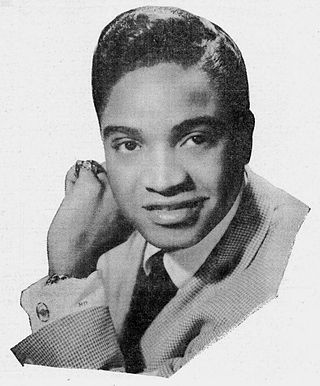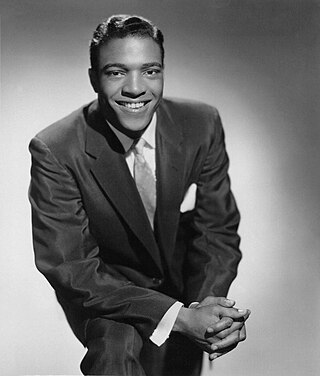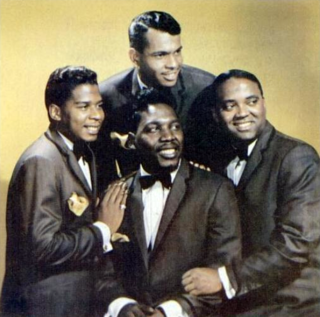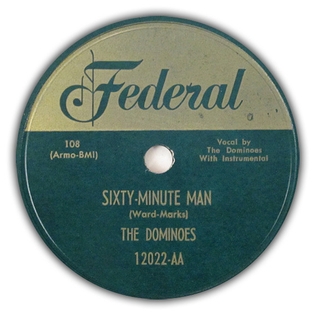Related Research Articles

Jack Leroy Wilson Jr. was an American singer of the 1950s and 1960s. He was a prominent figure in the transition of rhythm and blues into soul. Nicknamed "Mr. Excitement", he was considered a master showman and one of the most dynamic singers and performers in soul, R&B, and rock and roll history.

Clyde Lensley McPhatter was an American rhythm and blues, soul, and rock and roll singer. He was one of the most widely imitated R&B singers of the 1950s and early 1960s and was a key figure in the shaping of doo-wop and R&B.

The Drifters are an American doo-wop and R&B/soul vocal group. They were originally formed as a backing group for Clyde McPhatter, formerly the lead tenor of Billy Ward and his Dominoes in 1953. The second group of Drifters, formed in 1959 and led by Ben E. King, were originally an up-and-coming group named The Five Crowns. After 1965 members drifted in and out of both groups and many of these formed other groups of Drifters as well. Over the succeeding decades, several different bands, all called the Drifters, can trace roots back to these original groups, but contain few—if any—original members.

Benjamin Franklin Peay, better known as Brook Benton, was an American singer and songwriter who was popular with rock and roll, rhythm and blues, and pop music audiences during the late 1950s and early 1960s, with hits such as "It's Just a Matter of Time" and "Endlessly", many of which he co-wrote.

"What'd I Say" is an American rhythm and blues song by Ray Charles, released in 1959. As a single divided into two parts, it was one of the first soul songs. The composition was improvised one evening late in 1958 when Charles, his orchestra, and backup singers had played their entire set list at a show and still had time left; the response from many audiences was so enthusiastic that Charles announced to his producer that he was going to record it.

"Ahab the Arab" is a novelty song written and recorded by Ray Stevens in 1962.

Willie "Bill" Pinkney was an American performer and singer. Pinkney was often said to be the last surviving original member of The Drifters, who achieved international fame with numerous hit records. He was chiefly responsible for its early sounds. The Drifters have had a strong influence on soul, rhythm and blues, and rock and roll music. As an original group member, Bill Pinkney was a 1988 inductee into the Rock & Roll Hall of Fame with The Drifters.

"Good Rocking Tonight" is a jump blues song originally released in 1947 by its writer, Roy Brown and was covered by many recording artists. The song includes the memorable refrain, "Well I heard the news, there's good rocking tonight!" The song anticipated elements of rock and roll music.
"Money Honey" is a song written by Jesse Stone, which was released in September 1953 as the first single by Clyde McPhatter backed for the first time by the newly formed Drifters. McPhatter's voice, but not his name, had become well known when he was the lead singer for Billy Ward and the Dominoes. The song was an immediate hit and remained on the rhythm and blues chart for 23 weeks, peaking at number 1. Rolling Stone magazine ranked it number 252 on its list of the 500 Greatest Songs of All Time. The recording was reported to have sold more than two million copies by 1968.

Billy Ward and his Dominoes were an American R&B vocal group. One of the most successful R&B groups of the early 1950s, the Dominoes helped launch the singing careers of two notable members, Clyde McPhatter and Jackie Wilson.

"Sixty Minute Man" is an R&B record released on Federal Records in 1951 by the Dominoes. It was written by Billy Ward and Rose Marks and was one of the first R&B hit records to cross over to become a hit on the pop chart. It is regarded as one of the most important of the recordings that helped generate and shape rock and roll.
"Lovey Dovey" is a popular American rhythm and blues song originating in the 1950s and written by Eddie Curtis and Ahmet Ertegun, with the latter usually credited using his songwriter's pseudonym "Nugetre". The song's initial recording by The Clovers remains the best known version, reaching No. 2 for five weeks on the R&B charts in 1954.
"It's Just a Matter of Time" is a popular song written by Brook Benton, Clyde Otis, and Belford Hendricks. The original recording by Benton topped the Billboard Hot R&B Sides chart in 1959 and peaked at No. 3 on the Hot 100 pop chart, the first in a string of hits for Benton that ran through 1970.
"I'll Go Crazy" is a rhythm and blues song recorded by James Brown and The Famous Flames. Released as a single in 1960, it was Brown's fourth R&B hit, charting at #15. Brown and the Flames also performed it as the first song on their 1963 album Live at the Apollo.
"(Sweet Sweet Baby) Since You've Been Gone" is a song by singer Aretha Franklin. Released from her Lady Soul album in 1968, the song was successful, debuting at number 31 and peaking at number 5 on the Hot 100 for five weeks, and spending three weeks at number 1 on the Hot Rhythm & Blues Singles chart. The B-side, "Ain't No Way", was also a hit, peaking at number 16 on the Billboard Hot 100 and number 9 on the Hot Rhythm & Blues Singles chart.
"A Lover's Question" is a 1958 Pop, R&B hit for Clyde McPhatter. The single was written by Brook Benton and Jimmy T. Williams and was Clyde McPhatter's most successful Pop and R&B release. The bass singer is Noah Hopkins. "A Lover's Question" made it to #6 on the Billboard Hot 100 and was #1 for one week on the R&B chart.
"The Bells" is a rhythm and blues song written by Billy Ward and Rose Ann Marks and recorded by Billy Ward and His Dominoes in 1952, featuring Clyde McPhatter on lead tenor. It was released on Federal Records as the B-side of the group's single "Pedal Pushin' Papa". It was a bigger hit than the A-side, reaching #3 on the R&B chart.

The Checkers were an American doo-wop quintet formed in 1952. The original members were John Carnegie (Tenor/Lead), Charlie White (Tenor/Lead), Irwin "Teddy" Williams (Tenor), James Turner "Buddy" Brewer (Baritone), and Bill Brown. The group, only having recorded 25 singles for the King Records imprint and their subsidiary Federal Records broke up in 1955. The most notable aspect of the group was their constantly changing sound due to the 5 personnel changes that happened within their short existence. King kept on releasing bands under the pseudonym of "The Checkers" until the mid 70s.
References
- ↑ Whitburn, Joel (2004). Top R&B/Hip-Hop Singles: 1942-2004. Record Research. p. 168.
- 1 2 3 Propes, Steve; Dawson, Jim (1992). What Was the First Rock'n'Roll Record. Boston & London: Faber & Faber. pp. 105–108. ISBN 0-571-12939-0.
- 1 2 Holly George-Warren &, Anthony Decurtis (Eds.) (1976). The RollingStone Illustrated History of Rock & Roll (3rd ed.). New York: Random House. pp. 18–20. ISBN 0-679-73728-6.
- ↑ Whitburn, Joel (2013). Joel Whitburn's Top Pop Singles, 14th Edition: 1955-2012. Record Research. p. 94.
- ↑ White, Cliff (1991). "Discography". In Star Time (pp. 54–59) [CD booklet]. New York: PolyGram Records.